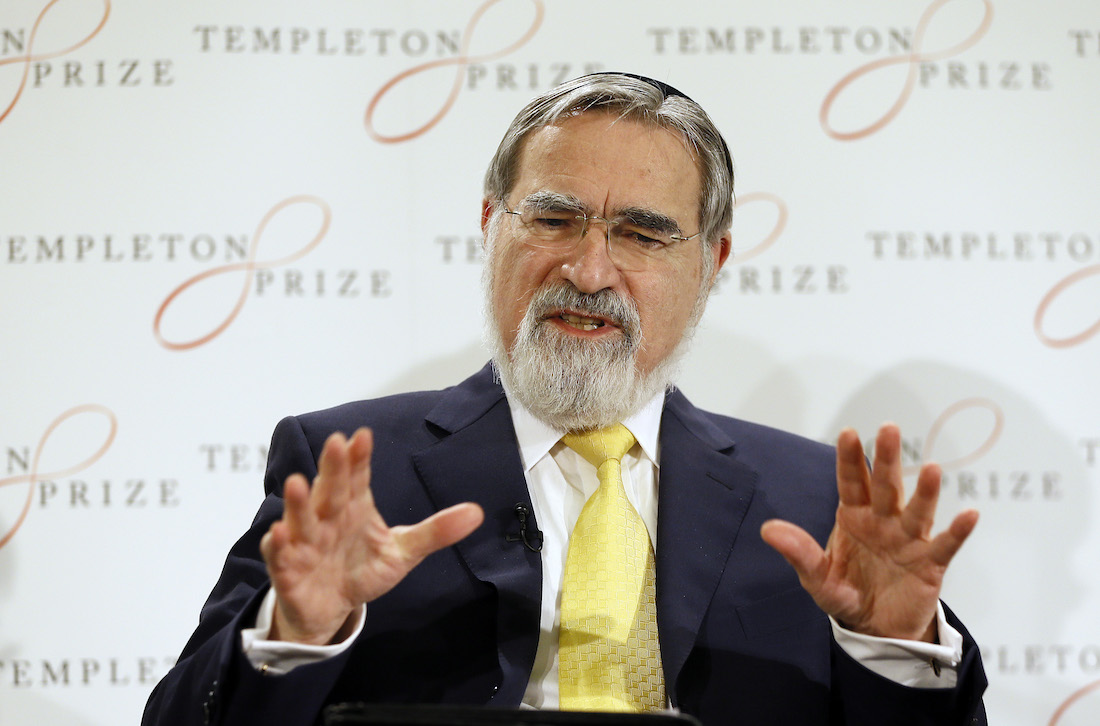Lord Rabbi Jonathan Sacks, the former Chief Rabbi of the UK and a member of the House of Lords, passed away early on the morning of Saturday, November 7, 2020, following his third bout with cancer. He was 72 years old. Rabbi Sacks, who was knighted in 2005, authored more than two dozen books and recorded the “Thought for the Day” broadcast on BBC’s Radio 4. The rabbi, who won the 2016 Templeton Prize, was buried on Sunday according to the government’s rigid COVID-19 guidelines, which allowed only 30 mourners to attend. Here are six of his most illustrative quotations:
1. Biblical morality is the morality of freedom.
[T]he Hebrew Bible—which speaks of a free God, not constrained by nature, who, creating man in his own image, grants him that same freedom, commanding him but not compelling him to do good. The entire biblical project, from beginning to end, is about how to honor that freedom—in personal relationships, families, communities, and nations. Biblical morality is the morality of freedom, its politics are the politics of freedom, and its theology is the theology of freedom. On this view, we have dignity because we can choose. Dignity is inseparable from morality and our role as choosing, responsible, moral agents. … Morality and human dignity go hand in hand. Lose one, and we will lose the other.
(Morality: Restoring the Common Good in Divided Times. 2020.)
2. Freedom is a moral achievement.
[O]nly to a free human people does slavery taste bitter. … [F]reedom and justice must belong to all, not some; that, under God, all human beings are equal; and that over all earthly power, the King of Kings, who hears the cry of the oppressed and who intervenes in history to liberate slaves. It took many centuries for this vision to become the shared property of liberal democracies of the West and beyond; and there is no guarantee that it will remain so. Freedom is a moral achievement, and without a constant effort of education it atrophies and must be fought for again.
(“A Pesach Message.”)
3. How Jew and Judaism helped create capitalism.
It is important to distinguish between Judaism as a faith and Jews as a people. Both have had an impact on the development of capitalism, in different ways. Judaism did so through its emphasis on work as virtue, made as a necessity, and private property as a precondition of individual liberty. Judaism did not share either the aristocratic disdain for work found in classical Greece or the occasional tendency to other-worldliness found in early Christianity. It saw this-worldly prosperity as a sign of God’s blessing, and work as man’s “partnership with God in the work of creation.”
Jews, throughout the Middle Ages, were often barred from owning land or entering the professions. As a result, many of them were forced into trade and finance, partly because of the Christian prohibition against taking interest. The result was that Jews became pioneers in banking and finance, as well as in international trade.
(Interview with the Acton Institute. Religion & Liberty. November/December 2001. Vol. 11, No. 6.)
4. Religion will return to the West.
I have pointed out the four great institutions of science, technology, the market, and the state cannot answer the three questions that every reflective individual will ask some time in life: Who am I? Why am I here? How then shall I live?
The science tells us how but not why.
Technology gives us power but doesn’t tell us how to use that power.
The market gives us choices but doesn’t tell us which choices to make.
And the liberal democratic state gives us a maximum of freedom but no guidance as to how to use that freedom.
Therefore, religion will return. In the meantime, we’ve got a gap to fill.
(“Faith and the Challenges of Secularism: A Jewish-Christian-Muslim Trialogue.” October 24, 2017.)
5. The difference between a social contract and a covenant.
In a contract, you make an exchange, which is to the benefit of the self-interest of each. … A covenant isn’t like that. It’s more like a marriage than an exchange. In a covenant, two or more parties each respecting the dignity and integrity of the other come together in a bond of loyalty and trust to do together what neither can do alone. A covenant isn’t about me; it’s about us. A covenant isn’t about interests; it’s about identity. A covenant isn’t about me, the voter, or me, the consumer, but about all of us together. Or in that lovely key phrase of American politics, it’s about “We, the people.”
(The American Enterprise Institute’s 2017 Irving Kristol Awards Annual Dinner. October 24, 2017.)
6. Justice cannot replace personal kindness (hessed).
The beauty of justice is that it belongs to a world of order constructed out of universal rules through which each of us stands equally before the law. Hessed, by contrast, is intrinsically personal. We cannot care for the sick, bring comfort to the distressed or welcome a visitor impersonally. If we do so, it merely shows that we have not understood what these activities are. Justice demands disengagement… Hessed is an act of engagement. Justice is best administered without emotion. Hessed exists only in virtue of emotion, empathy and sympathy, feeling-with and feeling-for. We act with kindness because we know what it feels like to be in need of kindness. We comfort the mourners because we known what it is to mourn. Hessed requires not detached rationality but emotional intelligence.
(To Heal a Fractured World: The Ethics of Responsibility. 2005.)
Bonus: The test of faith is recognizing God’s image in others.
The test of faith is whether I can make space for difference. Can I recognise God’s image in someone who is not in my image, whose language, faith, ideals are difference from mine? If I cannot, then I have made God in my image instead of allowing him to remake me in His.
(The Dignity of Difference, 2003.)

